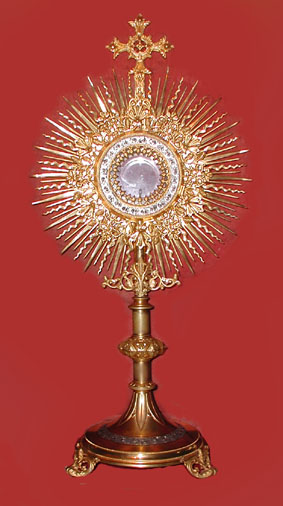I know this will always be a silly debate.
Do you catholics and non-catholics actually believe you/they are drinking real blood and eating real flesh (cannibalism)? Please say no.
I asked a priest this but I wanted to hear what you guys thought.
I would like to take this opportunity to reassure you that Jesus, to my knowledge, has never passed through my digestive tract and been released after a trip to the loo.

Guilty, though I may be, of many things in my life - I'm as pure as the driven snow on that one!
@Rival and
@exchemist have already covered much that need be said be said in answer to your question (very well, too) but I'll add a few more thoughts of my own:
In his book
Font of Life (2012), Garry Wills correctly notes how the church father St. Augustine of Hippo (354 – 430 AD) "
ridiculed" the idea that the eucharist was the literal body and blood of Christ. "
Augustine repeatedly says," writes Wills, "
that Christ cannot be chewed, digested, and excreted."
As you will know, there is a great deal of diversity in Christian interpretation of the import of the Lord's Supper and its sacramental character. This ranges from the purely symbolic '
memorialism' of denominations like Baptists, Anabaptists and non-denominational churches; the real and effective "
spiritual presence" viewpoint espoused by traditional Calvinists; the most widely shared cross-denominational perspective, that of the "
real presence" of the sacramental blood and body of Christ in the communion wavers and wine as believed by Anglicans and Lutherans among others (to varying degrees) and finally the most extreme versions, that of
metousiosis (change of essence or inner reality) adhered to by Eastern Orthodox and the
transubstantiation affirmed by Roman Catholics.
In none of these interpretations, including the last two, is there any insinuation that Jesus is '
eaten, chewed, digested and excreted' in a cannibalistic or theophagic manner. Using Scholastic philosophical language and its conceptual framework, the Catholic Church distinguishes between substance and species in the consecrated eucharistic bread and wine. The accidents of bread and wine (size, weight, taste, texture) do remain. So the flesh and blood is not consumed under the
form or properties of flesh and blood (such that no scientific analysis would ever conclude that it is, physically speaking, anything other than bread and wine), but under the sacramental signs of bread and wine.
The sense in which it is "
Christ's glorified body and blood" is not perceptible by the senses (i.e. if you tested the consecrated host in a lab, it would be comprised of just any old particles of wheat and flour) but must be discerned and experienced spiritually.
I admit that transubstantiation is a peculiar doctrine to those outside the church. But as weird as it might be, one does need to keep a sense of proportion and not exaggerate its meaning to a ridiculous degree.
The idea that Christians gathered to commit acts of ritual cannibalism was, of course, the accusation of many contemporary Roman era writers - I guess, understandably - but it was a gross misinterpretation and slander that led to much social distrust and state repression of the early Christian movement.
If we probe further, though, and consider the question of 'why' this admittedly strange doctrine would have emerged at all in the first century Christian circles, I think we can arrive at a decently cogent hypothesis:
It needs to be noted - as attested also by Paul in his letter to the Corinthians, as well as in the synoptic gospels - that Jesus only announced a "
new covenant" on the night he was betrayed to death, during the Last Supper with the institution of the Eucharistic ritual. St. Paul's version of this Jesus tradition and words of institution:
"For I received from the Lord what I also handed on to you, that the Lord Jesus on the night when he was betrayed took a loaf of bread, and when he had given thanks, he broke it and said, ‘This is my body that is for you. Do this in remembrance of me.’ In the same way he took the cup also, after supper, saying, ‘This cup is the new covenant in my blood. Do this, as often as you drink it, in remembrance of me.’ For as often as you eat this bread and drink the cup, you proclaim the Lord’s death until he comes." (
1 Corinthians 14:24-26)
These words - among the earliest sayings ever attributed directly to Jesus, owing to the primitive dating of St. Paul's epistle, which pre-dates any of the canonical gospels - were by far the most 'offensive' words Jesus could have used under the Torah, in which 'blood' was absolutely forbidden to be consumed:
Leviticus 17:10
If anyone from the house of Israel or a foreigner living among them eats any blood, I will set My face against that person and cut him off from among his people.
As one Jewish scholar notes:
"If anyone eats blood, that person must be cut off from his peers.” The ban on eating blood is fundamental to the Torah. The ban occupies a central place in the covenant."
On the same night where he impliedly declares the Torah an 'old covenant' through the announcement of a 'new covenant', Jesus refers to the wine in the cup as his "blood", as if to ram the point home that the Old Covenant really is surpassed by a New one for his band of disciples - a New Testament, with new possibilities not circumscribed by the preceding one.
I honestly think he said this because he considered it the most offensive and outrageous way of symbolically violating the Torah and thus definitively communicating a new beginning, an abrogating of the old by a "
new covenant".
It was intended to be a maximally shocking statement, as the last ever major teaching to his disciples.

